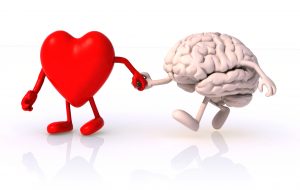What Makes a Heart Healthy?
by Michael D. Allen, DC, NMD
Functional Neurologist
I just treated a retired sheriff. She had a history of heart valve problems and tachycardia (fast heartbeat) so her MD told her to have an ablation (where the doctor burns out part of her heart’s electrical system). As an alternative she was given some medication but she didn’t like how it made her feel. She called her doctor and he said to stop taking the drugs, “You’ll be OK”. Wow! Did any doctor ever check her heart’s connection to her brain? It’s logical to assume that doctors know that the heart and brain are connected by nerves, but how many doctors actually know what to do about it?
It seems like more patients are presenting with what could be considered to be cardiac complaints, but their condition is not intrinsic to their heart. While common symptoms like chest pains, labored breathing, arrhythmias, reduced ejection fractions and other heart problems might be run-of-the-mill to a cardiologist, we must consider that these same signs and symptoms can arise from places other than the heart. In reality, these involved patients can be the trickiest. They may not require the usual prescriptions of blood pressure medication, statins, aspirin, beta-blockers, ACE inhibitors or other drugs, or even ablation, yet that is what they often receive from their doctor in an attempt to control their symptoms.
We have known from as far back as 2005 from the Journal Brain* that cardiac arrhythmia and sudden cardiac death can be related to specific neurological, psychiatric, or cardiovascular conditions. That means that besides the heart itself, a confused nervous system and even emotional issues can create heart problems. We see neurological confusion all the time in our office in the form of dysfunctional physiological reflexes. These findings are often treated by functional and non-invasive means and lead to increased health.
The Brain Connection
Although the neurological mechanisms seemed unclear to them, the authors of the article found that these heart problems may start in vulnerable patients via autonomic (or automatic) responses that cascade from the brain and spinal cord, and on to the heart. In other words, heart attacks can start in the brain. The mechanisms are perhaps related to the recovery period between heartbeats -– what the researchers called the pro-arrhythmic state –- induced through the outgoing signals from the brain (what they refer to as the “efferent autonomic drive”) and not necessarily inherent to the heart.
The key to the Brain article is the “efferent autonomic drive.” These outgoing signals from the brain control every organ in your body except your heart; they only influence your heart. Your heart has an intrinsic rate that makes it able to beat on its own at about 90 beats per minute. It is these same signals that tend to slow down your heart’s rate to the normal 72 beats per minute.
The article points out that change in the intensity and sidedness of specific brain activity may bring on an imbalance between the nerves that go to the right and left side of the heart. In fact, the authors found that an asymmetry in heart function disrupts the way these nerve signals flow through the heart, predisposing the person to heart irregularities.
One group of patients particularly at risk is those with coronary artery disease. However, the researchers found that it was inappropriate to relate the heart changes to the severity of coronary artery disease. Since these effects appear to start in the brain, these same effects are also apparent in some patients with seemingly normal coronary arteries. This means that even people with apparently normal cardiac function can express these same heart problems. These apparently normal patients can be the trickiest. They may have symptoms but they have no cardiac pathology. We can best help these people by diagnosing and directing brain-based therapy that is unique to their particular needs. This is where we — the “functional neurologists” — come in.
Functional Neurology Approach
The Brain research has shown that there may be a higher probability of right brain influences on heart-related centers during mental and physical stress and this tendency may display as a greater opportunity for right sympathetic pathologies. It is always appropriate to properly diagnose cardiac complaints, but sometimes they may be related to nerve and muscle issues like neck and shoulder pains, numbness and tingling in the arms, and chest pains. A functional neurologist is skilled at diagnosing the many ways the human nervous system can display itself, including the mismatched signals that can exist between the brain and the heart — and any other associated system(s).
When skillfully considered, an expertly and uniquely designed treatment program that includes a functional neurological work-up is an appropriate and productive complementary treatment adjunct when no other cardiac problems are diagnosed by a cardiologist. Further, appropriately delivered chiropractic treatments have no side effects.
It’s Now Up To You
Do you have heart or upper body complaints related to your heart? How about somebody you might know who has heart problems? Give us a call and have your heart checked out today. It could be the very thing that changes your heart and saves your life. Call today!
* (Brain, Jan 2005; Mental stress and sudden cardiac death: asymmetric midbrain activity as a linking mechanism; 128: 75-85; Critchley, Taggart, et al)




